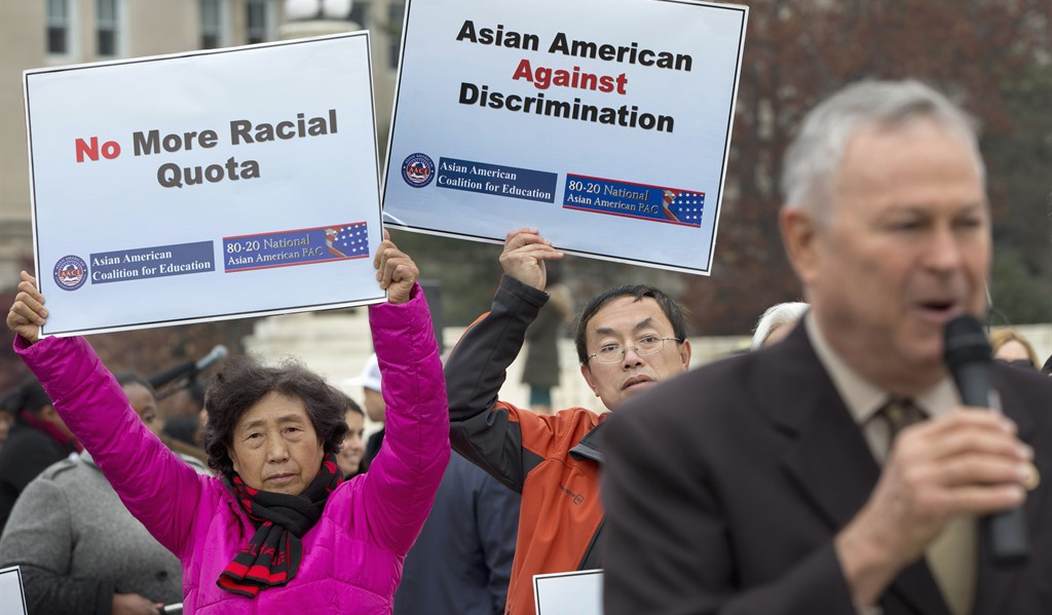Proposition 16 in California, which would have allowed “diversity” to be a factor in hiring and school admissions, went down in flames on Election Day, largely because several majority-Hispanic counties voted against it.
It wasn’t even close. While pro-affirmative action groups and every major Democratic organization in the state backed the measure and supporters outspent opponents $20 million to $1.5 million, the measure still lost by 14 points.
It was a shocking defeat, especially since all the major Hispanic groups backed the measure. But something funny happened on the way to climbing aboard the diversity train; it had already left the station long ago.
Hispanics in California are a political and economic force to be reckoned with. And their growing numbers have allowed them to flex those muscles — without the benefit of government quota systems.
It is noteworthy that despite every major Latino organization promoting Prop 16, every single majority-Hispanic county voted against it. That might be because there has been a significant rise in the number of Hispanics attending the University of California system without the benefit of affirmative action. Records show Latinos accounting for 34 percent of all UC admissions in 2019, up from 14 percent in 1996.
Hispanics constitute some 39 percent of California’s population, and represented more than half of all high school graduates in 2018. Consequently, the group remains underrepresented in the university system, but they have clearly made significant progress.
Along with Asians, Hispanics voted down the affirmative action measure because they just don’t need it.
Frank Xu, a Chinese immigrant, was a chief player in the No on Proposition 16 campaign. He explained in an op-ed that, “It is wrong for the government to have the power to favor some of its citizens over some others. I witnessed in China how evil a government could be once it has this kind of power.”
He argued that Democratic legislators proposed Prop 16 not to seek diversity but as part of a racial activism program that included, among other things, board quotas for private corporations in California and a study on potential reparations for Black Americans. He believed the backers of affirmative action are “striving for quotas, as well as for government-mandated racial indoctrination and punitive, race-based payments extracted from taxpayers.”
Asians are an immigrant success story and they fear the government taking away what they’ve earned through hard work and perseverance simply because they’re the wrong color. This is driving them away from Democrats. They aren’t Republicans yet. But if the GOP wakes up and grasps the opportunity to attract Asian voters with an opportunity agenda, they may switch.
Perhaps it’s talk like this that angers Asians and Hispanics who have just begun to make strides in the economy because of achievement, not affirmative action.
A Los Angeles Times editorial enthusiastically endorsed the proposal, claiming that America is not a meritocracy, and that dismantling “the racism baked into our institutions” is essential to providing opportunity to people of color. Passing Prop 16, the Times argued, would help.
Advocates of Proposition 16 made all sorts of excuses for why it failed. It never mentioned “affirmative action” in the referendum’s language, or the language was vague. In truth, it was a naked attempt to make race a “factor” in hiring decisions and government policies. If that sounds familiar it’s because that’s the same standard used by colleges and universities in admissions. They claim to use race only as a “one factor” in choosing students when in actuality, it is the single most important determination.
The result in California would have been the same.
Ward Connerly, a former University of California regent and noted civil rights activist, led the fight for passing Proposition 209, which established bans on race-based admissions and hiring in 1996. He helped lead the fight against Proposition 16 and wrote after the victory, “embracing equality, not mapping out racial proportions, is an American value.”
California Hispanics apparently embrace that notion too.










Join the conversation as a VIP Member